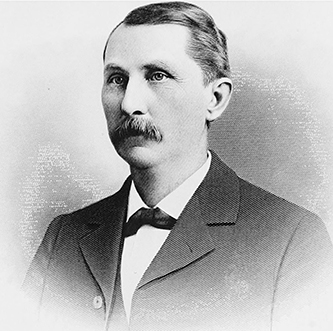5 Jan. 1847–1 Sept. 1920

Richard Harrison Speight, physician, planter, and state senator, was born in rural Edgecombe County, the son of John Francis and Emma Lewis Speight. His father was an ordained minister of the Methodist Protestant church and a prosperous farmer. Young Speight attended a neighborhood school until, at age seventeen, he volunteered as a corporal in Company K, Seventy-first North Carolina Regiment, for service in the Civil War. He participated in a number of skirmishes as well as in the Battles of South West Creek near Kinston and Bentonville near Goldsboro. In early 1865 he contracted typhoid fever and was sent home.
In the closing months of the war and for a year afterwards he completed his preparatory education and in the fall of 1866 entered The University of North Carolina, where he pursued a premedical course. Admitted to the University of Maryland School of Medicine, he graduated in 1870 after two years of study.
Speight established a practice in Edgecombe County, where he also became a successful planter. He served three terms as president of the county medical society and one as vice-president of the State Medical Society. On his farms, which extended across county lines, he produced huge crops of peanuts, tobacco, corn, and cotton as well as grains for livestock and produce for his family and tenants. Concerned about the welfare of farmers, he served as vice-president of the State Farmers' Alliance and as a delegate to several meetings of the National Farmers' Congress. He was the principal founder and president of a large cotton seed oil mill.
In addition, he served several terms in the North Carolina Senate. As a physician as well as a humanitarian, Speight was concerned about the welfare of people with mental illnesses and served as chairman of a legislative committee on psychiatric hospitals. Under the leadership of this committee, the insanity laws of the state were revised and updated. Two governors appointed him to the governing board of the North Carolina Insane Asylum, but he declined a second term when he was in the senate. As a legislator Speight sponsored the bill to place a statue of Civil War governor Zebulon B. Vance on the capitol grounds. Returning home, he continued his medical practice until age sixty-eight and his farming until his death at seventy-three.
Speight married Margaret Powell of Edgecombe County, and they were the parents of a dozen children: Robert P., Henry L., Fannie W., Mary P., Richard H., Jr., Jesse P., George W., Joseph P., Seth E., Frank J., James Ambler, and Elias Carr. After the death of his wife in 1894, Speight married Margaret Whitefield. A member of the Methodist Protestant church, he was buried in the family cemetery on his farm.